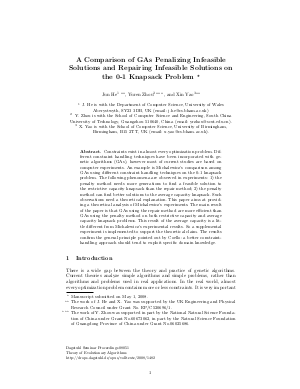A Comparison of GAs Penalizing Infeasible Solutions and Repairing Infeasible Solutions on the 0-1 Knapsack Problem
Authors Jun He, Yuren Zhou, Xin Yao
-
Part of:
Volume:
Dagstuhl Seminar Proceedings, Volume 8051
Part of: Series: Dagstuhl Seminar Proceedings (DagSemProc) - License:
 Creative Commons Attribution 4.0 International license
Creative Commons Attribution 4.0 International license
- Publication Date: 2008-05-06
File

PDF
DagSemProc.08051.3.pdf
- Filesize: 353 kB
- 39 pages
Document Identifiers
Subject Classification
Keywords
- Genetic Algorithms
- Constrained Optimization
- Knapsack Problem
- Computation Time
- Performance Analysis
Metrics
- Access Statistics
-
Total Accesses (updated on a weekly basis)
0Document
0Metadata
Abstract
Constraints exist in almost every optimization problem. Different constraint handling techniques have been incorporated with genetic algorithms (GAs), however most of current studies are based on computer experiments. An example is Michalewicz's comparison among GAs using different constraint handling techniques on the 0-1 knapsack problem. The following phenomena are observed in experiments: 1) the penalty method needs more generations to find a feasible solution to the restrictive capacity knapsack than the repair method; 2) the penalty method can find better solutions to the average capacity knapsack. Such observations need a theoretical explanation. This paper aims at providing a theoretical analysis of Michalewicz's experiments. The main result of the paper is that GAs using the repair method are more efficient than GAs using the penalty method on both restrictive capacity and average capacity knapsack problems. This result of the average capacity is a little different from Michalewicz's experimental results. So a supplemental experiment is implemented to support the theoretical claim. The results confirm the general principle pointed out by Coello: a better constraint-handling approach should tend to exploit specific domain knowledge.
Cite As Get BibTex
Jun He, Yuren Zhou, and Xin Yao. A Comparison of GAs Penalizing Infeasible Solutions and Repairing Infeasible Solutions on the 0-1 Knapsack Problem. In Theory of Evolutionary Algorithms. Dagstuhl Seminar Proceedings, Volume 8051, pp. 1-39, Schloss Dagstuhl – Leibniz-Zentrum für Informatik (2008)
https://doi.org/10.4230/DagSemProc.08051.3
BibTex
@InProceedings{he_et_al:DagSemProc.08051.3,
author = {He, Jun and Zhou, Yuren and Yao, Xin},
title = {{A Comparison of GAs Penalizing Infeasible Solutions and Repairing Infeasible Solutions on the 0-1 Knapsack Problem}},
booktitle = {Theory of Evolutionary Algorithms},
pages = {1--39},
series = {Dagstuhl Seminar Proceedings (DagSemProc)},
ISSN = {1862-4405},
year = {2008},
volume = {8051},
editor = {Dirk V. Arnold and Anne Auger and Jonathan E. Rowe and Carsten Witt},
publisher = {Schloss Dagstuhl -- Leibniz-Zentrum f{\"u}r Informatik},
address = {Dagstuhl, Germany},
URL = {https://drops.dagstuhl.de/entities/document/10.4230/DagSemProc.08051.3},
URN = {urn:nbn:de:0030-drops-14822},
doi = {10.4230/DagSemProc.08051.3},
annote = {Keywords: Genetic Algorithms, Constrained Optimization, Knapsack Problem, Computation Time, Performance Analysis}
}
